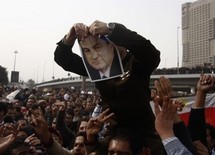Mubarak stays put on 'departure day'
Ali Khalil
CAIRO, Ali Khalil- The Egyptian opposition's "day of departure" for Hosni Mubarak ended at midnight Friday with the embattled president refusing to transfer power amid a rising tide of international calls for him to stand down.
Mubarak defied huge protests in central Cairo and in Alexandria aimed at forcing his ouster as US President Barack Obama said talks have begun on a transition in Egypt and EU leaders said it was time for change.

"He needs to listen to what is voiced by the people and make a judgment about a pathway forward that is orderly, that is meaningful... and serious," Obama said in carefully worded comments.
"I believe that President Mubarak cares about his country. He is proud, but he is also a patriot."
Obama said he understood "some discussions" had begun on a political transition, with details to be worked out by Egyptians themselves, and said violence against demonstrators was unacceptable.
"We continue to be crystal clear that we oppose violence as a response to this crisis," he said, as Egyptian authorities called for protesters thronging central Cairo to go home but also vowed not to use force.
EU leaders were more forthright in their call for Mubarak to step aside.
At a summit in Brussels, the European Union's 27 leaders said Egypt's "transition process must start now" and condemned this week's violence, while issuing a veiled threat of suspending aid.
Mubarak himself has said he would like to quit but feared that chaos would ensue.
On Thursday, ABC television's Christiane Amanpour said that in an interview with Mubarak, he blamed the Muslim Brotherhood for the violence of recent days.
Clashes left at least eight people dead and more than 800 hurt on Wednesday and Thursday. According to UN estimates, more than 300 people have been killed since the protests began.
Mubarak was "fed up with being president and would like to leave office now, but cannot, he says, for fear that the country would sink into chaos," Amanpour said.
Mubarak's onetime foreign minister and a future possible presidential candidate, Arab League chief Amr Mussa, said on Friday he doubted his former boss would leave any time soon.
"I do not think he will leave. I think he will stay until the end of August," Mussa told France's Europe 1 radio before himself later going to Tahrir Square in what his office called a "calming gesture."
The New York Times reported that Washington has been pushing proposals for Omar Suleiman, Mubarak's veteran intelligence chief and now vice president, to head a transitional government.
But Prime Minister Ahmed Shafiq ruled out the possibility that Mubarak would transfer power to Suleiman.
At Cairo's Tahrir (Liberation) Square, epicentre of anti-Mubarak protests, more than 10,000 people stayed behind in a festive atmosphere after nightfall, many preparing to camp under canvas.
On the Muslim day of prayers and rest, tens of thousands of people from all walks of life earlier filled the square which has seen 11 straight days of protests that have shaken the pillars of Mubarak's three-decade rule.
A pro-government rally in the upscale Mohandeseen neighbourhood of the capital was attended by just dozens of people.
In isolated violence on Friday, however, Al-Jazeera news channel, which ran blanket coverage of the uprising after it erupted on January 25, said a "gang of thugs" had ransacked its Cairo offices.
Iran's supreme leader Ayatollah Ali Khamenei fanned Western concerns about the turmoil in their key ally Egypt, calling on its people to rise up and create an Islamic state.
The White House rejected Mubarak's warning of chaos.
Mubarak and his government should sit down with a broad coalition of opposition and civil society groups shut out of power in Egypt to discuss a new political compact, White House spokesman Robert Gibbs said.
"There are concrete actions that he can take and the vice president can take towards moving in the path of real change that can lessen instability and can ensure that we don't descend into the chaos that he describes," he said.
Gibbs also accused Iran of hypocrisy because of its own suppression of protests over the June 2009 re-election of President Mahmoud Ahmadinejad.
Defence Minister Mohammed Hussein Tantawi -- regarded by Washington as a key plank of any post-Mubarak administration -- visited Tahrir Square to appeal to demonstrators to end their protest in the light of Mubarak's pledge not to seek re-election in September.
He urged opposition leaders, including the supreme guide of the powerful Muslim Brotherhood, Mohammed Badie, to join talks with the government on political transition.
Shafiq reiterated late on Friday that the anti-regime protesters would not be removed by force.
And a curfew imposed in Cairo and two other cities but widely ignored was shortened by four hours to between 7:00 pm (1700 GMT) and 6:00 am, state television said.
Egyptian journalist Ahmed Mohammed Mahmud died on Friday of gunshot wounds sustained during clashes between Mubarak supporters and anti-government protesters, state-owned Al-Ahram daily said.
It said he had been shot by sniper fire while taking pictures from his flat near Tahrir Square.
The government on Friday said that widespread charges of "an official policy against the international media were false" and that any attacks on reporters were "unacceptable."
Anti-Mubarak protests were also held on Friday in Egypt's second city Alexandria, where tens of thousands gathered in the city centre, and in a raft of provincial cities.
----------------------------------------------------------------------